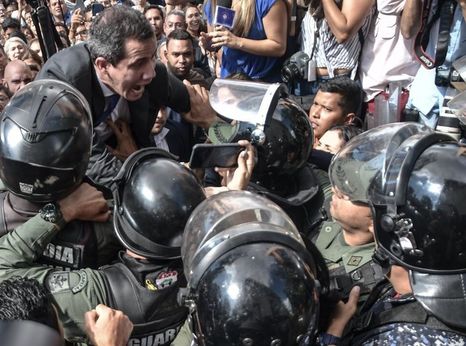Attacks against opposition members grow

Upon National Assembly President Juan Guaidó’s return to Venezuela on 11 February 2020, his uncle Juan José Márquez was arbitrarily detained and accused of smuggling explosives on his commercial flight from Lisbon, Portugal to the Simón Bolívar International Airport in Maiquetía, Venezuela. Mr. Marquez’s arrest represents the continuation of a worrying pattern targeting those close to opposition lawmakers and other members of their staff.
Other opposition lawmakers have themselves been arbitrarily detained:
• Ismael Léon, lawmaker, was detained from 21 – 23 January 2020 then conditionally released.
• Juan Requesens, lawmaker reportedly incommunicado since 5 February. His representatives manifest that he has been tortured and suffered severe irregularities in his judicial case.
• Gilber Caro was enforcedly disappeared for a month after being detained since 20 December 2019. He continues to be in custody.
• Roberto Marrero, National Assembly President's chief of staff, arrested on 21 March 2019 and being held by the Bolivarian National Intelligence Service (SEBIN) in El Helicoide, Caracas.
President Nicolas Maduro and his government continue to intimidate, harass, physically abuse, arbitrarily detain and forcibly disappear National Assembly representatives and staff in an attempt to silence political dissent. In recent years, dozens of opposition members have been forced to flee the country and request asylum in the face of threats they have received from the Maduro government. At least two opposition lawmakers (Freddy Guevara and Roberto Enriquez) have sought the protection of foreign embassies in Venezuela, where they have remained for nearly three years.
Since the outbreak of the COVID-19 pandemic in Venezuela, authorities have also targeted other critical voices like Darvinson Rojas, a Venezuelan journalist and prisoner of conscience who reported on COVID-19. Detained on 21 March and conditionally released on 2 April 2020, Darvinson was accused of ‘advocacy of hatred’ and ‘instigation to commit crimes’ and released on bail pending a criminal investigation. Amnesty International considers these charges to be politically motivated to silence his reporting on the pandemic in Venezuela and we demand the case against him is closed.
These actions are part of a policy of repression that seem to originate from the top of the Maduro government as a way to hinder civil and political rights.
In last year’s report, Hunger for Justice: Crimes against Humanity in Venezuela, Amnesty International concluded that the selective extrajudicial executions, arbitrary detentions, and deaths and injuries caused by the excessive use of force by Nicolás Maduro’s government as part of a systematic and widespread policy of repression since at least 2017 may constitute crimes against humanity.
Since 2014 Venezuelans have fled in unprecedented numbers in search of safety and a dignified future abroad. By March 2020, an estimated 4.9 million had fled the country and it is believed that this figure will reach 5.5 million by the end of 2020.
Please note that Twitter is a massive social media platform in Venezuela, and other communication means are practically inexistent, particularly mail, we advise the use of Twitter to contact authorities in the country. We have addressed this letter to the Venezuelan embassy.